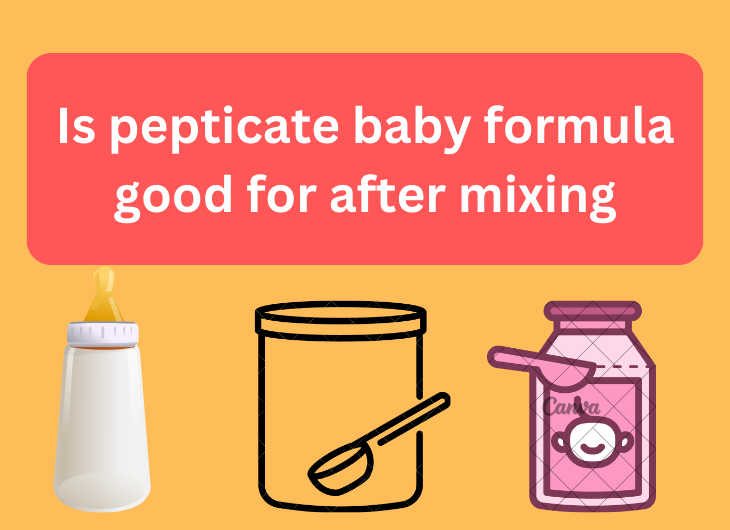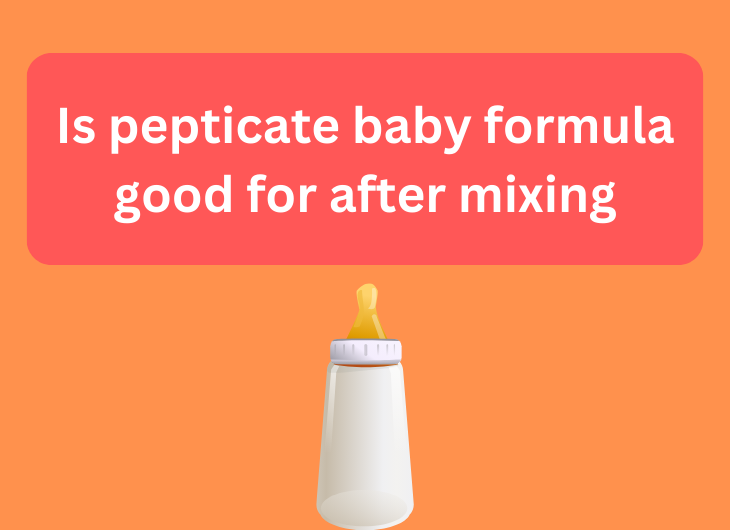Introduction: Is pepticate baby formula good for after mixing?
Selecting the right baby formula is a crucial decision for parents, and impacts a child’s growth and development significantly. One such formula that has caught the attention of parents is the Pepticate baby formula. However, it’s essential to delve into the safety and benefits of this formula after mixing to ensure it’s the right choice for your little one.
Understanding Pepticate Baby Formula
Pepticate baby formula is a specialized infant formula designed to cater to specific dietary needs. It is formulated to be easily digestible and gentle on a baby’s delicate stomach. The key feature of Pepticate is its formulation which breaks down proteins into smaller peptides, making it easier for infants to digest.
Post-Mixing Nutritional Value
After mixing Pepticate baby formula according to the manufacturer’s instructions, it retains its nutritional value. The process of mixing the formula does not significantly alter the nutrients present, ensuring that the baby receives the essential proteins, fats, carbohydrates, vitamins, and minerals required for healthy growth. Pepticate is typically designed to mimic breast milk as closely as possible in terms of nutritional composition. It is carefully balanced to provide the necessary nutrients that support a baby’s overall development.
Considerations for Usage
When considering Pepticate baby formula for your child, there are a few important factors to keep in mind:
Consultation with Healthcare Professional:
Before introducing any new formula to your baby, it’s essential to consult a pediatrician or healthcare professional. They can evaluate your baby’s specific needs and advise whether Pepticate is an appropriate choice.
Checking for Allergies:
It’s crucial to be aware of any allergies or sensitivities your baby might have to the ingredients in Pepticate formula. Always read the ingredient list carefully and be observant of any adverse reactions.
Proper Mixing and Preparation:
Following the mixing and preparation instructions provided by the manufacturer is crucial to ensure the formula is well-prepared and retains its intended nutritional value.
Importance of Choosing the Right Baby Formula
Choosing the right baby formula is a critical decision that can significantly impact a baby’s health and development. Infants rely entirely on their diet for growth and nutrition, making it essential for parents to make informed choices when it comes to feeding. The type of formula you choose can influence not only your baby’s physical health but also their overall well-being and comfort.
Types of Baby Formula
- Standard Baby Formula
Standard baby formula is designed to meet the nutritional needs of most healthy infants. It typically contains a balanced combination of proteins, fats, carbohydrates, vitamins, and minerals. This type of formula is suitable for the majority of babies and provides the necessary nutrients for their growth and development.
- Specialized Formulas
Specialized baby formulas cater to infants with specific dietary requirements or sensitivities. This category includes:
Hypoallergenic Formulas: These formulas are ideal for babies who may be prone to allergies or have shown signs of sensitivity to certain ingredients, such as cow’s milk protein.
Lactose-Free Formulas: Designed for babies with lactose intolerance, these formulas provide an alternative source of nutrition without lactose, a type of sugar found in cow’s milk.
Soy-Based Formulas: Intended for infants with lactose intolerance or those whose parents prefer a plant-based option, soy-based formulas utilize soy protein as the primary protein source.
Exploring specialized formulas allows parents to understand the options available if their child has unique dietary needs.
- Organic Baby Formula
Organic baby formula has gained popularity among parents seeking natural and pesticide-free options. These formulas are made from organic ingredients and are free from synthetic chemicals and genetically modified organisms (GMOs). Choosing organic formulas can provide peace of mind for parents concerned about the quality and source of the ingredients.
Ingredients and Nutritional Value
Baby formula is carefully formulated to provide essential nutrients that support an infant’s growth and development. These nutrients include:
- Proteins: Crucial for muscle and tissue development.
- Fats: Provide energy and support brain development.
- Carbohydrates: Serve as an energy source.
- Vitamins: Play various roles in overall health.
- Minerals: Contribute to bone and tissue formation.
Understanding these key nutrients helps parents make informed decisions about the nutritional content of the formula they choose.
Common Allergens in Baby Formula
While baby formulas are generally safe, some infants may be sensitive or allergic to certain ingredients. Common allergens in baby formula include cow’s milk protein and soy. It’s essential for parents to be aware of potential allergens and to monitor their baby’s reactions when introducing a new formula.
Preparation Guidelines
Proper preparation of baby formula is vital to ensure that your child receives the intended nutrition in the right concentration. Manufacturers provide detailed instructions on how to mix and prepare their specific formula. It’s crucial to follow these guidelines carefully, including the ratio of formula to water and the water temperature.
Sterilization and Hygiene
Maintaining a clean and sterile environment when preparing and handling baby formula is essential. Sterilize bottles, nipples, and utensils before use to prevent bacterial contamination. Proper hygiene practices help safeguard your baby’s health.
Storage and Handling
Storing the formula correctly preserves its freshness and nutritional value. Store the prepared formula in the refrigerator and use it within the recommended timeframe to avoid spoilage. Proper storage techniques ensure that your baby’s formula remains safe and nutritious.
Ensuring Safety and Quality
Selecting a reputable and trusted baby formula brand is crucial for your baby’s well-being. Look for brands that adhere to stringent quality and safety standards. This ensures that the formula you choose meets the necessary nutritional requirements and is free from harmful contaminants.
Reading Labels and Ingredients
Understanding how to read and interpret baby formula labels empowers parents to make informed choices. Labels provide information about the ingredients, nutritional content, and any specific features of the formula. Paying attention to labels helps you select the formula that aligns with your baby’s needs.
Consulting Healthcare Professionals
Pediatricians and healthcare professionals play a vital role in guiding parents through the process of selecting the right baby formula. They can assess your baby’s health, growth, and dietary needs, offering personalized recommendations for the most suitable formula.
Addressing Concerns and Questions
Parents may have various concerns or questions related to baby formula, including allergies, feeding schedules, or transitioning from breast milk. Healthcare providers are an invaluable resource for addressing these concerns, and offering guidance and reassurance.
FAQs: Is pepticate baby formula good for after mixing?
Q: What are the key differences between standard and specialized baby formulas?
A: Standard formulas are designed for most healthy babies, providing a balanced combination of essential nutrients. Specialized formulas cater to specific dietary needs, such as hypoallergenic options for allergies or lactose-free formulas for lactose-intolerant infants.
Q: Are organic baby formulas worth considering?
A: Yes, organic baby formulas use organic ingredients and avoid synthetic additives, offering a natural alternative. They are free from pesticides and genetically modified organisms (GMOs), making them a suitable choice for parents concerned about the source and quality of ingredients.
Q: How should I prepare baby formula safely?
A: Follow the manufacturer’s preparation guidelines precisely, including the right ratio of formula to water and correct water temperature. Sterilize bottles, nipples, and utensils before use, and store prepared formula in the refrigerator to maintain its freshness.
Q: Can I switch baby formulas if my baby seems uncomfortable or has digestive issues?
A: Consult your pediatrician before making any changes. They can guide you on the appropriate formula based on your baby’s specific needs and potential digestive sensitivities.
Q: How can I identify if my baby has an allergy to a particular formula?
A: Look for signs of allergic reactions, such as rash, hives, excessive fussiness, vomiting, or diarrhea after feeding. If you suspect an allergy, consult a healthcare professional for further evaluation.
Q: Is it safe to use expired baby formula in an emergency?
A: It is not recommended to use expired formula, as it may have degraded nutritional value and could potentially pose health risks to your baby. Always use fresh and up-to-date formulas.
Q: Can I prepare baby formula in advance and refrigerate it for later use?
A: It’s best to prepare formula just before feeding. If needed, you can prepare a batch and refrigerate it for up to 24 hours. However, always follow the manufacturer’s guidelines regarding storage and usage.
Q: Are there any baby formula options for babies with a cow’s milk protein allergy?
A: Yes, there are specialized hypoallergenic formulas made from extensively hydrolyzed proteins or amino acids, suitable for babies with cow’s milk protein allergies. Consult a pediatrician for guidance on the right choice.
Q: Is it essential to use warm water when mixing baby formula?
A: Using warm water helps in dissolving the formula powder easily, but it’s crucial to follow the manufacturer’s instructions regarding water temperature. Some formulas may require specific water temperatures for optimal mixing.
Q: Can I dilute baby formula to make it last longer or save costs?
A: No, it’s important to follow the recommended formula-to-water ratio as diluting the formula can deprive your baby of essential nutrients and may not provide adequate nutrition for healthy growth and development.
Conclusion: Is pepticate baby formula good for after mixing?
In conclusion, Pepticate baby formula is formulated to be gentle on a baby’s digestive system and provide essential nutrients required for growth and development. It is important to consult with a healthcare professional before introducing any new formula to your baby. Additionally, always follow the mixing and preparation guidelines to ensure the formula maintains its nutritional integrity. Ultimately, the suitability of Pepticate or any other baby formula will vary for each child, so it’s important to make an informed decision based on your baby’s individual needs and any professional advice you may seek.
Visit the link to read more: https://family-fitness-fun.com/is-natural-balance-dog-food-being-discontinued-10-important-faqs/





